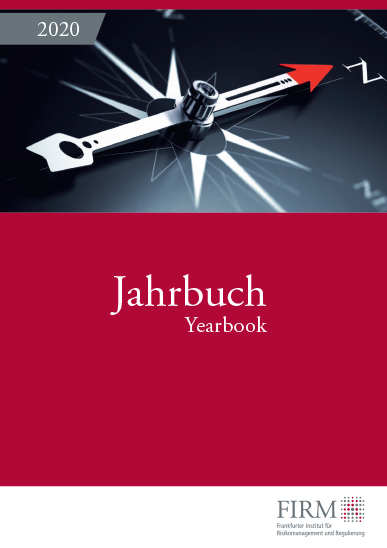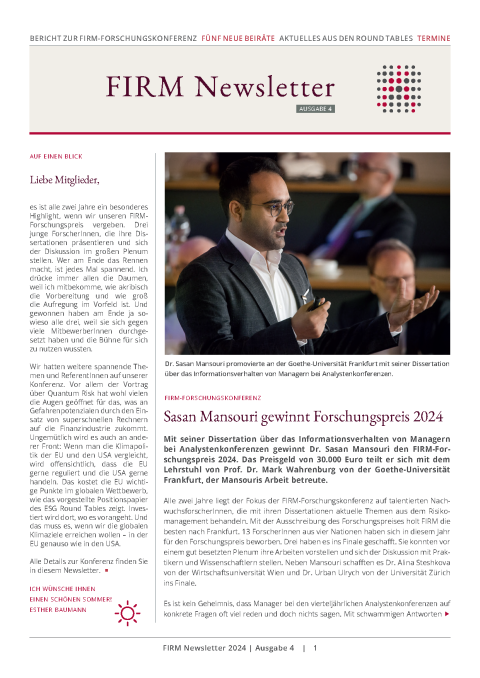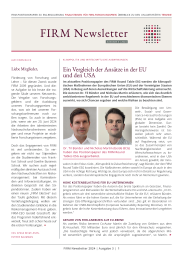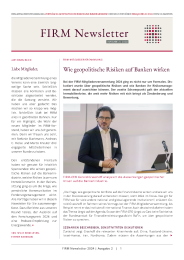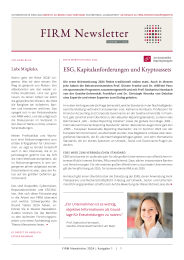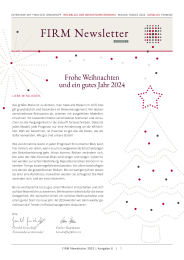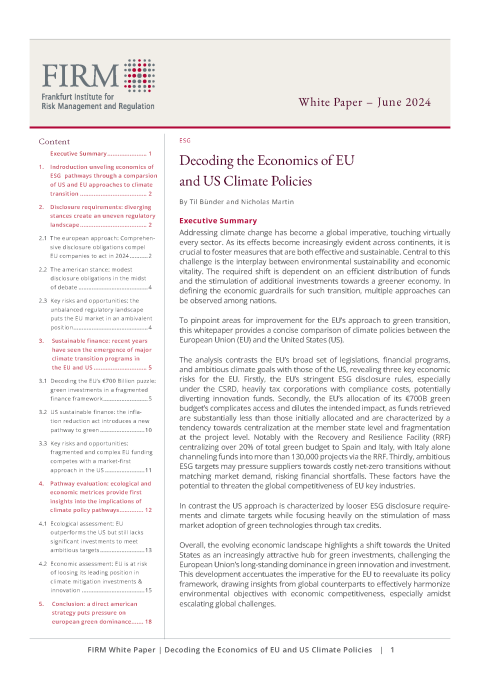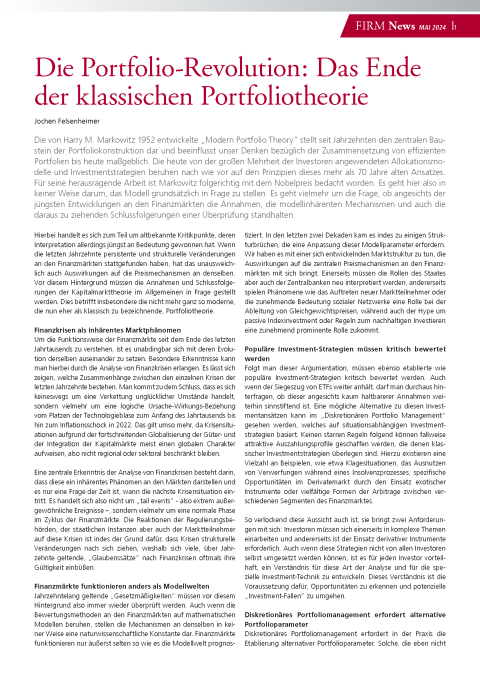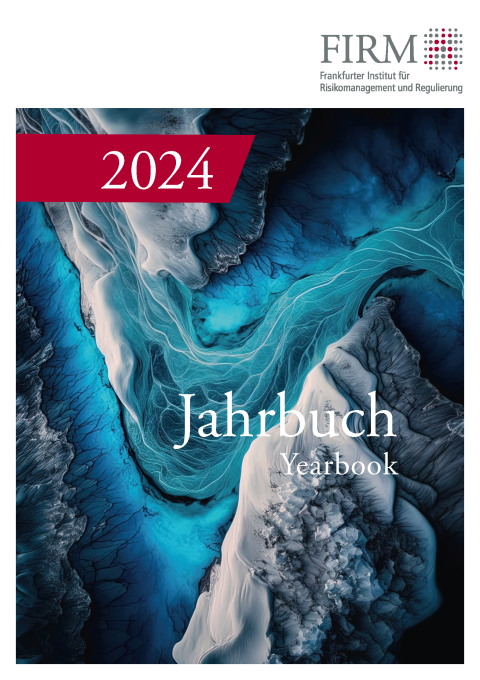Whitepaper
ESG – Climate risks
How the climate and energy policies of the EU and the USA affect the economy
The current position paper of the FIRM Round Table ESG examines the climate policy measures of the European Union (EU) and the United States (US) in terms of their impact on economic performance.
The authors Dr. Til Bünder and Nicholas Martin explain how the significantly more ambitious regulations in the EU will affect various economic levels, where opportunities will arise and what risks need to be considered. A comparison of the EU and US climate and energy policies shows that the US is becoming more attractive due to its direct and simple approach to promoting green investments. The EU, on the other hand, is jeopardizing its leading position in the field of green innovation and investment due to its more complex regulation and the fragmentation of financing mechanisms. It is therefore crucial that the EU continues to develop its political framework conditions in such a way that climate targets are achieved and its economic competitiveness is secured at the same time.
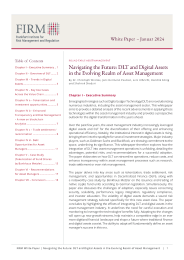
Asset Management
Navigating the Future: DLT and Digital Assets
in the Evolving Realm of Asset Management
Emerging technologies such as digital ledger technology (DLT) are revolutionizing numerous industries, including the asset management sector. This white paper analyzes the latest advances in the application of these technologies in asset management and provides an outlook on the digital transformation in the coming years.
The wealth management industry is increasingly using digital assets and DLT to diversify its offering and improve operational efficiency. Institutional interest in digital assets in particular is on the rise, putting them in the spotlight for various investment strategies. The commitment of industry giants such as Goldman Sachs and BlackRock underlines the importance of this trend.
This white paper examines the integration of DLT into asset management, describing the benefits as well as the potential risks. Recommendations for a successful introduction are also given. It shows how DLT can rationalize processes, reduce costs and create transparency within asset management processes, in research, trade processing and risk management.
The paper addresses key areas such as tokenization, trade settlement, risk management and the possibilities of decentralized finance (DeFi). A case study by Bankhaus Metzler on the issue and trading of native crypto fund shares under German law will also be shown. The authors provide an outlook on the impact of the integration of DLT and digital assets on the asset management industry.
Authors: Dr. Christoph Wronka, Jens Hermann Paulsen, Lars Ulbricht (all Deloitte) as well as Hendrik König and Shahrok Shedari (both Bankhaus Metzler)
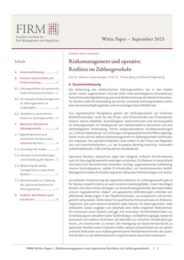
Payments
Risk management and operational
resilience in payment transactions
The importance of electronic payments has increased rapidly in recent years. The reasons for this are technological innovations, advancing digitalization and modernization of the market infrastructure. For banks, the processing of account and card payment transactions therefore represents a core value chain and an important business segment.
The position paper highlights the challenges that banks currently face in payment traffic. To this end, the Round Table conducted a survey among FIRM member institutions, surveyed the status quo, and developed important internal and external recommendations for action.
Authors: Dr. Markus Ampenberger (BCG), Prof. Dr. Tobias Berg (Goethe University), Daniel Regending (Deutsche Bank)
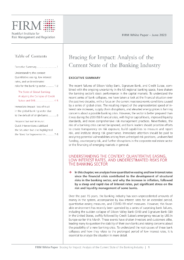
Macroeconomics
Bracing for Impact: Analysis of the
Current
State of the Banking Industry
Uncertainty remains high following the recent bank failures of Silicon Valley Bank, Signature Bank and Credit Suisse. Is there a danger of a renewed crisis? The risk should not be underestimated, write the authors of the current FIRM position paper. According to their assessment, however, the banks are better prepared than in the financial crisis of 2007/2008.
FIRM CEO Gerold Grasshoff, together with co-author Dr. Til Bünder (BCG), has spent the last few months intensively studying the developments on the
Banking market busy. “You have to go way back to understand the context in which current developments are taking place,” Grasshoff explains. The banking sector has been fed with cheap money over the past 15 years, through low interest rates over a very long period and through quantitative easing.
Authors: Gerold Grasshoff (FIRM) and Dr. Til Bünder (BCG)
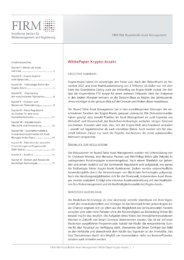
Asset Management
Cryptoassets
Crypto assets have had a difficult year. After hitting record highs in November 2021 and a market capitalization of $3 trillion, the end of quantitative easing also marked the end of the highs in the crypto market. The collapse of the crypto exchange FTX provided another low point. Many of the events in recent months are reminiscent of the dotcom bubble at the beginning of the millennium. This makes it all the more important to take a close look at the opportunities and risks of this asset class.
In past meetings, the Asset Management Round Table has taken a closer look at the various facets of the crypto market. The discussion panels showed that both asset management practitioners and experts from business and academia continue to see huge potential in blockchain technology. However, it is expected that the crypto world will undergo drastic changes
– both at the regulatory and monetary level.
Authors: Christoph Wronka, Jens Paulsen and Nils-Philipp Böhm (all Deloitte)
Professional Articles
The end of classical portfolio theory
The current article deals with the question of whether the assumptions, the mechanisms inherent in the model and the conclusions to be drawn from them stand up to scrutiny in view of the latest developments on the financial markets.
Author: Dr. Jochen Felsenheimer, Managing Director of XAIA Investment GmbH
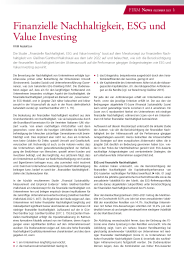
Financial sustainability, ESG and value investing
The current specialist article deals with the study “Financial sustainability, ESG and value investing”. It examines how the consideration of financial sustainability in stock selection affects the performance of common investment strategies such as ESG and value investing.
Authors: FIRM editorial team
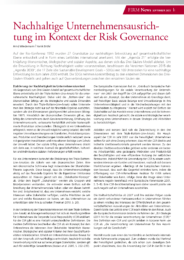
Sustainable corporate orientation in the context of risk governance
The concept of success, which used to be one-dimensional and focused only on economic performance, has changed to a three-dimensional concept of success that also reflects ecological and social success (triple bottom line).
Authors: Prof. Dr. Arnd Wiedemann and Yanik Bröhl
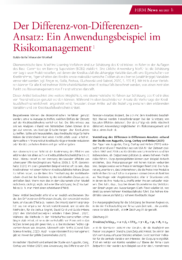
The Difference-of-Differences Approach: An Application Example in Risk Management
This article highlights the difference-in-differences approach as one way in which econometric techniques can be used to estimate the credit risk of financial institutions.
Authors: Dr. Guido Golla and Dr. Alexander Mosthaf
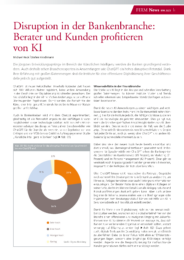
Disruption in the banking industry: advisors and customers benefit from AI
Recent leaps in development in the field of artificial intelligence will fundamentally change banks. Industry experts see high disruptive potential in applications like ChatGPT. The institutions are well positioned for a more aggressive digitization of their business models.
Authors: Michael Heck and Dr. Stefan Hirschmann
Yearbooks
Yearbook 2024
In the FIRM Yearbook 2024, we address the current focal points in risk management. More than 50 authors have contributed to the yearbook. They write about cyber risks, cryptocurrencies, artificial intelligence and machine learning, reputation, ESG and governance as well as many other financial and non-financial risk topics. We also report on the work of our Risk Round Tables and present the most recently published position papers.
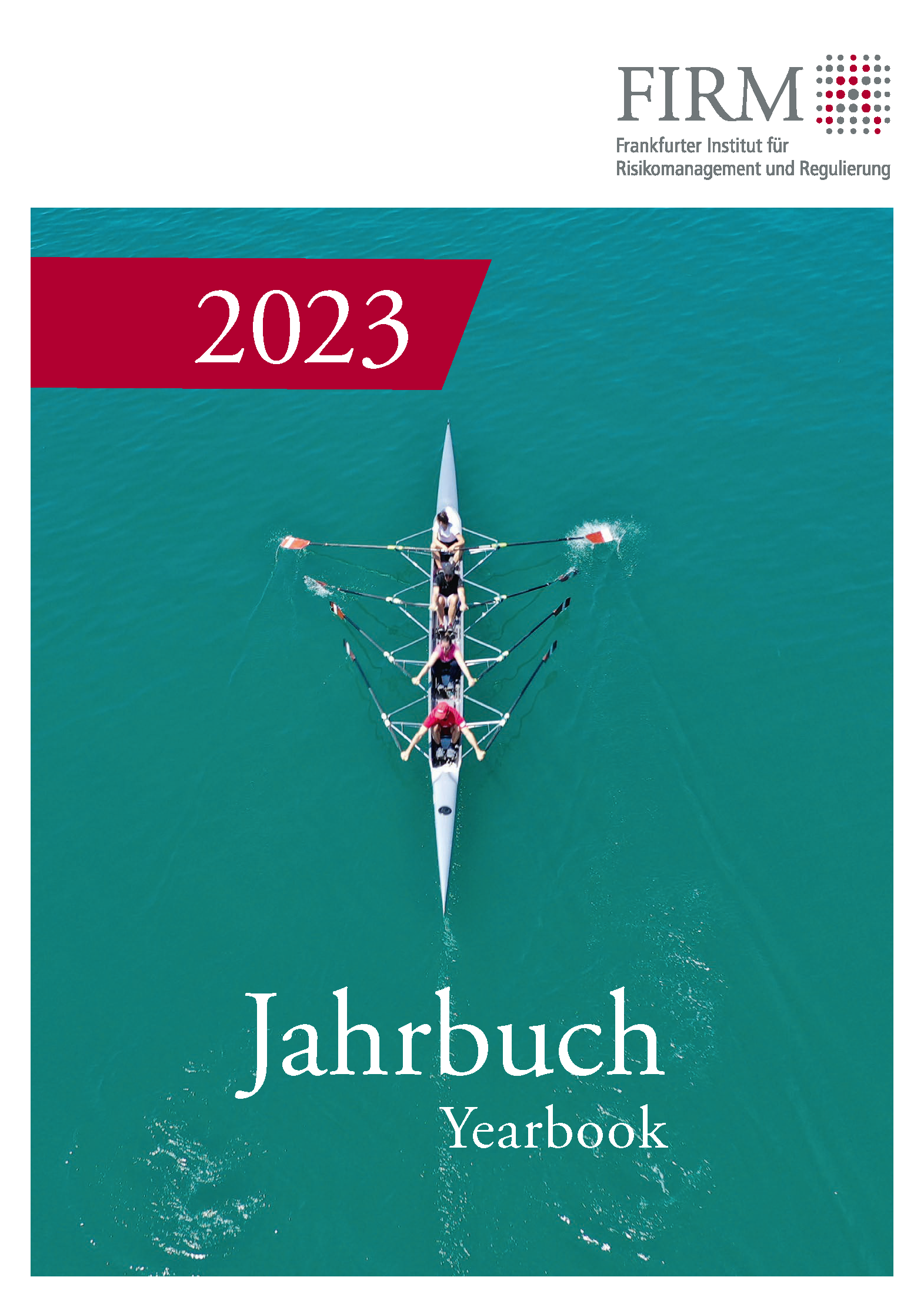
Yearbook 2023
In the FIRM Yearbook 2023, we show how the dialog between business and science succeeds in practice. With contributions from 50 authors on ESG, payments, cyber risk, artificial intelligence and much more. In addition, reports and position papers from our FIRM Risk Round Tables.
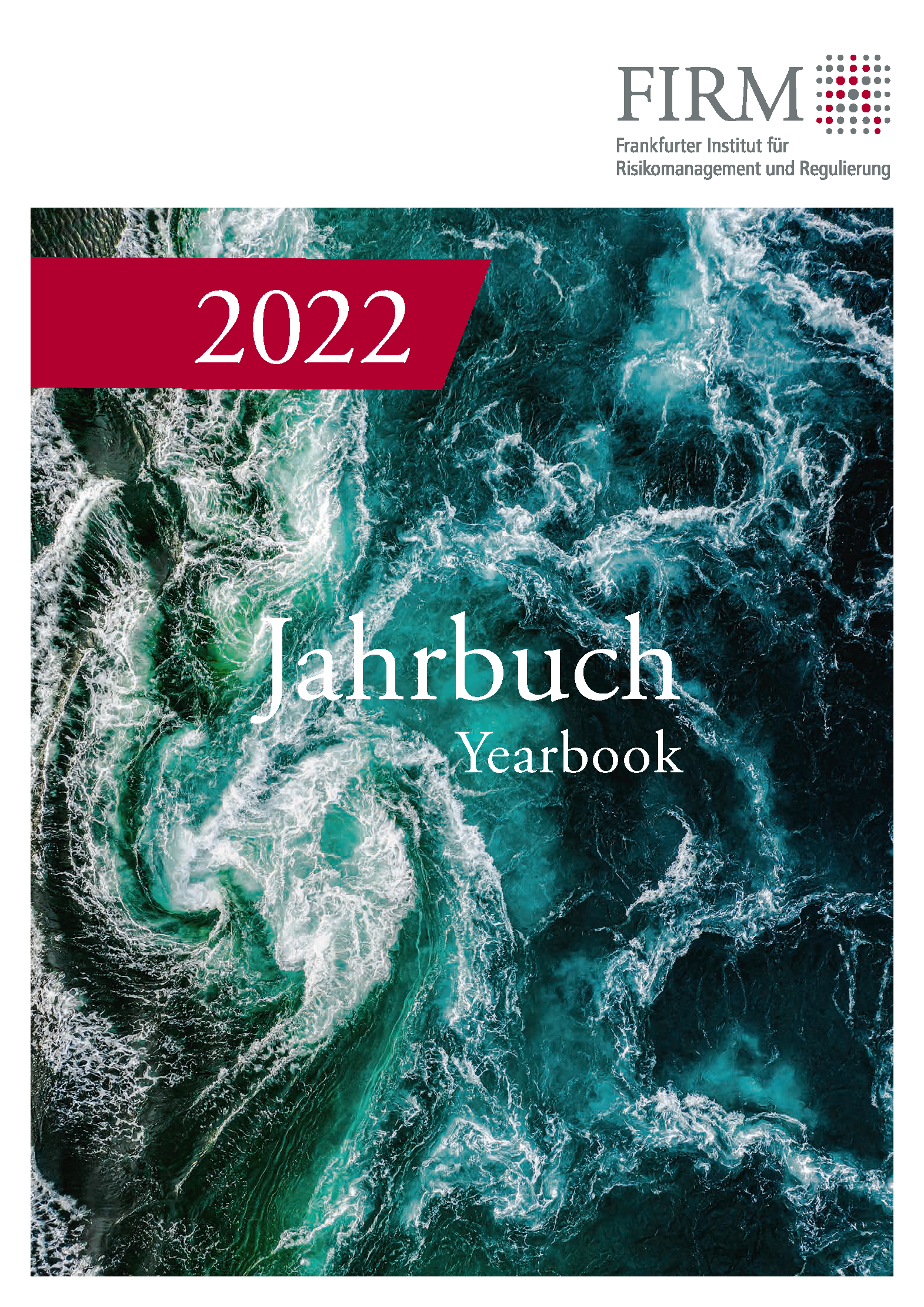
Yearbook 2022
In the FIRM Yearbook 2022, more than 50 authors from business and academia explain in their contributions and studies on ESG risks and taxonomy, cyber risks, consequences of the Corona pandemic, nonfinancial risks, and payments and artificial intelligence in banks, which developments are currently shaping risk management.
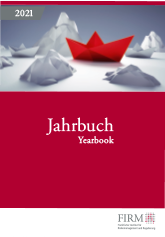
Yearbook 2021
